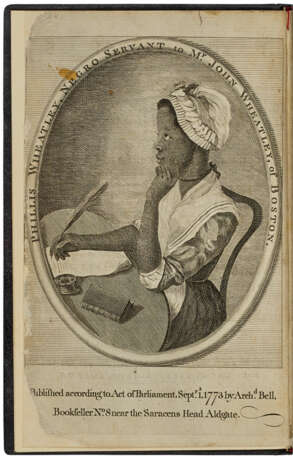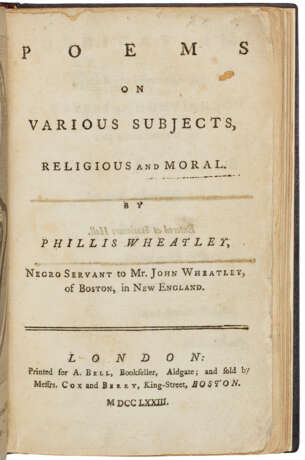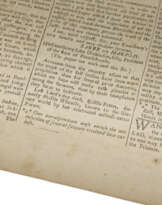ID 967650
Los 1 | Poems on Various Subjects, Religious and Moral
Schätzwert
$ 20 000 – 30 000
Phillis Wheatley Peters, 1773
WHEATLEY PETERS, Phillis (c.1753-1784). Poems on Various Subjects, Religious and Moral. London: Bell, 1773.
The first published book of poetry by an African American, from the library of her later editor and champion Gloster Herbert Renfro, and likely used by him for his edition of her poems. In Renfro's words, "One century ago American literature, then in its infancy, recieved no small degree of enrichment from the poetic genius of an African slave." Born in West Africa, Phillis Wheatley was kidnapped and enslaved as a young child and sold in 1761 to John and Susanna Wheatley in Boston. They chose the name "Phillis" after the ship on which the girl had endured the Middle Passage. The Wheatley family quickly recognized her intellectual prowess and encouraged her studies in the classics. From a young age, she corresponded with intellectuals like the Mohegan preacher Samuel Occum, and was close with the Mather family. Inspired to write poetry after reading John Addison's experimental drama Rosamond, her verses engage with the tradition of Milton, Pope, and Dryden—as well as ancient writers like Horace, Ovid, and Terence, the latter of whom she specifically calls out in her work as a fellow African. The frontispiece, a portrait of her at her desk writing, is often attributed to the enslaved artist Scipio Moorhead, to whom one of her poems is addressed. This portrait is the first known to depict an American woman writer.
Wheatley’s verse eulogy of English evangelist George Whitefield (see following lot) was published in 1770, gaining the attention of Selina Hastings, Countess of Huntingdon (to whom Whitefield had been the personal chaplain). After a failure to get a book of her poems published in Boston, she turned to the Countess, who became her patron. To convince the printers to undertake the project, she had to submit an attestation that the poetry was truly her work, signed by prominent Boston men who examined her in court; this document is reprinted in the present volume. She traveled to London in 1773 and was greeted as a literary celebrity—Ignatius Sancho dubbed her "Genius in Bondage." But before she was able to meet King George, or even her own patron, she had to return to Boston to attend the ailing Susanna.
Reviews of the book in London were positive, but many drew attention to the hypocrisy of Americans who were lauding Phillis's genius while doing nothing to help her escape enslavement. This negative attention perhaps played a role in the Wheatleys granting Phillis her freedom in November 1773. In 1778 she married John Peters, a free person of color, and endeavored to publish a second volume of poetry. However, due to the economic collapse following the Revolutionary War and American publishers' continued resistance to her work, this effort proved unrealized before her untimely death in 1784.
The bibliography of this edition is complex; Roger Stoddard has identified two nearly identical editions of 1773, although he notes there are many further variants within them. The present copy matches all the points of his "Edition 1," with State B of the title, ad leaf, and portrait and turned chain lines in gatherings A, O-Q. Robinson, in Phillis Wheatley: A Bio-Bibliography, describes an earlier state of the first edition which does not have the dedication or attestation leaves, and has a variant state of the advertisement—perhaps a very rare early issue, or perhaps an incomplete copy misidentified. It is not mentioned by Stoddard. Wegelin 432; Sabin 10316; Stoddard & Whitesell 236 (Edition 1). See also Amanda Law, "The Transatlantic Publication of Phillis Wheatley's Poems on Various Subjects, Religious and Moral," in The Women's Print History Project, 10 July 2020; David Waldstreicher, The Odyssey of Phillis Wheatley: a Poet's Journey through American Slavery (2023); and Life and works of Phillis Wheatley: containing her complete poetical works, numerous letters, and a complete biography of this famous poet of a century and a half ago, edited by G. Herbert Renfro (1916).
Octavo (170 x 105mm). 3pp. contents and 1p. publisher's ad at end. Engraved portrait frontispiece attributed to Scipio Moorhead (frontispiece mounted and trimmed at outer edge with losses at outer corners, title and final leaf neatly silked at edge, slim stain at upper margin, a few spots). Modern black morocco gilt, decorated endpapers; modern cloth box. Provenance: Gloster Herbert Renfro, 1867-1894, a Black American teacher and lawyer (ownership signature on p. 57, possibly his notes for his edition in copying pencil throughout).
| Künstler: | Phillis Wheatley (1753 - 1784) |
|---|---|
| Kategorie des Auktionshauses: | Gedruckte Bücher |
| Künstler: | Phillis Wheatley (1753 - 1784) |
|---|---|
| Kategorie des Auktionshauses: | Gedruckte Bücher |
| Adresse der Versteigerung |
CHRISTIE'S 20 Rockefeller Plaza 10020 New York Vereinigten Staaten | ||||||||||||||
|---|---|---|---|---|---|---|---|---|---|---|---|---|---|---|---|
| Vorschau |
| ||||||||||||||
| Telefon | +1 212 636 2000 | ||||||||||||||
| Fax | +1 212 636 4930 | ||||||||||||||
| Nutzungsbedingungen | Nutzungsbedingungen | ||||||||||||||
| Versand |
Postdienst Kurierdienst Selbstabholung | ||||||||||||||
| Zahlungsarten |
Banküberweisung | ||||||||||||||
| Geschäftszeiten | Geschäftszeiten
|








